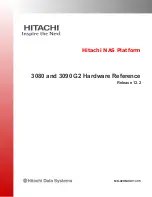
Section 27 Power-Down Modes
Rev. 3.00 Jan 25, 2006 page 783 of 872
REJ09B0286-0300
states of on-chip peripheral modules other than the SCI, PWM, and PWMX, are retained as long
as the prescribed voltage is supplied.
Software standby mode is cleared by an external interrupt (NMI, IRQ15 to IRQ0, KIN9 to KIN0,
or WUE15 to WUE8), the
RES
pin input, or
STBY
pin input.
When an external interrupt request signal is input, system clock oscillation starts, and after the
elapse of the time set in bits STS2 to STS0 in SBYCR, software standby mode is cleared, and
interrupt exception handling is started. When exiting software standby mode with an IRQ15 to
IRQ0 interrupt, set the corresponding enable bit to 1. When exiting software standby mode with a
KIN9 to KIN0 or WUE15 to WUE8 interrupt, enable the input. In these cases, ensure that no
interrupt with a higher priority than interrupts IRQ15 to IRQ0 is generated. In the case of an
IRQ15 to IRQ0 interrupt, software standby mode is not exited if the corresponding enable bit is
cleared to 0 or if the interrupt has been masked by the CPU. In the case of a KIN9 to KIN0 or
WUE15 to WUE8 interrupt, software standby mode is not exited if input is disabled or if the
interrupt has been masked by the CPU.
When the
RES
pin is driven low, system clock oscillation is started. At the same time as system
clock oscillation starts, the system clock is supplied to the entire LSI. Note that the
RES
pin must
be held low until clock oscillation stabilizes. When the
RES
pin goes high after clock oscillation
stabilizes, the CPU begins reset exception handling.
When the
STBY
pin is driven low, software standby mode is cancelled and a transition is made to
hardware standby mode.
Figure 27.3 shows an example in which a transition is made to software standby mode at the
falling edge of the NMI pin, and software standby mode is cleared at the rising edge of the NMI
pin.
In this example, an NMI interrupt is accepted with the NMIEG bit in SYSCR cleared to 0 (falling
edge specification), then the NMIEG bit is set to 1 (rising edge specification), the SSBY bit is set
to 1, and a SLEEP instruction is executed, causing a transition to software standby mode.
Software standby mode is then cleared at the rising edge of the NMI pin.
Summary of Contents for H8S/2158
Page 10: ...Rev 3 00 Jan 25 2006 page viii of lii...
Page 36: ...Rev 3 00 Jan 25 2006 page xxxiv of lii B Product Lineup 863 C Package Dimensions 864 Index 865...
Page 47: ...Rev 3 00 Jan 25 2006 page xlv of lii Appendix Figure C 1 Package Dimensions TBP 112A 864...
Page 54: ...Rev 3 00 Jan 25 2006 page lii of lii...
Page 70: ...Section 1 Overview Rev 3 00 Jan 25 2006 page 16 of 872 REJ09B0286 0300...
Page 118: ...Section 3 MCU Operating Modes Rev 3 00 Jan 25 2006 page 64 of 872 REJ09B0286 0300...
Page 126: ...Section 4 Exception Handling Rev 3 00 Jan 25 2006 page 72 of 872 REJ09B0286 0300...
Page 198: ...Section 6 Bus Controller Rev 3 00 Jan 25 2006 page 144 of 872 REJ09B0286 0300...
Page 326: ...Section 10 8 Bit PWM Timer PWM Rev 3 00 Jan 25 2006 page 272 of 872 REJ09B0286 0300...
Page 440: ...Section 15 Watchdog Timer WDT Rev 3 00 Jan 25 2006 page 386 of 872 REJ09B0286 0300...
Page 606: ...Section 17 I 2 C Bus Interface IIC Rev 3 00 Jan 25 2006 page 552 of 872 REJ09B0286 0300...
Page 742: ...Section 19 Multimedia Card Interface MCIF Rev 3 00 Jan 25 2006 page 688 of 872 REJ09B0286 0300...
Page 750: ...Section 21 D A Converter Rev 3 00 Jan 25 2006 page 696 of 872 REJ09B0286 0300...
Page 768: ...Section 22 A D Converter Rev 3 00 Jan 25 2006 page 714 of 872 REJ09B0286 0300...
Page 770: ...Section 23 RAM Rev 3 00 Jan 25 2006 page 716 of 872 REJ09B0286 0300...
Page 824: ...Section 26 Clock Pulse Generator Rev 3 00 Jan 25 2006 page 770 of 872 REJ09B0286 0300...
Page 844: ...Section 27 Power Down Modes Rev 3 00 Jan 25 2006 page 790 of 872 REJ09B0286 0300...
Page 878: ...Section 28 List of Registers Rev 3 00 Jan 25 2006 page 824 of 872 REJ09B0286 0300...
Page 926: ...Index Rev 3 00 Jan 25 2006 page 872 of 872 REJ09B0286 0300...















































